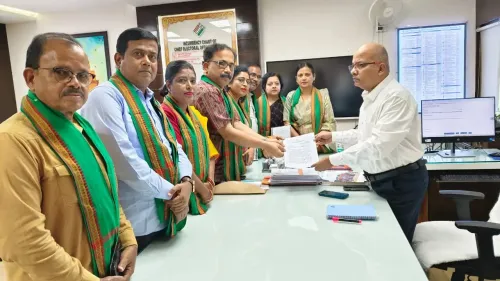How is the Melioidosis Threat Impacting MP?

Synopsis
Key Takeaways
- Melioidosis poses a significant health risk, particularly to paddy farmers.
- Proactive government measures include testing, treatment, and public awareness.
- Training programs for healthcare professionals are underway to improve diagnosis.
- Immediate medical intervention is critical for symptoms resembling TB.
- Farmers are urged to take precautions during the post-monsoon season.
Bhopal, Sep 19 (NationPress) In light of troubling reports from AIIMS-Bhopal, Chief Minister Mohan Yadav has firmly committed to addressing the rise of melioidosis, a lethal bacterial infection that resembles tuberculosis (TB) and increasingly endangers paddy farmers throughout Madhya Pradesh.
The AIIMS report indicates confirmed cases across more than 20 districts, linking the uptick in infections to the growth of paddy farming and the availability of water sources—conditions that are perfect for the bacteria Burkholderia pseudomallei, which flourishes in contaminated soil and stagnant water.
Farmers, particularly those working barefoot in wet fields, face heightened risks, as do individuals with diabetes or those who consume alcohol excessively.
Worried about the health and livelihood of agricultural workers, CM Yadav has instructed the Principal Secretaries of the Health and Agriculture Departments to initiate a collaborative effort aimed at testing, treatment, and raising public awareness.
"The health and prosperity of farmers and the general populace is our utmost priority," he stated, reaffirming the government's dedication to safeguarding the welfare of the underprivileged.
The Health and Agriculture Departments have been assigned the task of investigating cases in both potential and affected regions.
Villages will be notified, and farmers will receive education about the symptoms and prevention methods. If anyone exhibits symptoms such as a persistent fever, chronic cough, or chest pain unresponsive to TB treatment, immediate medical support will be organized.
Simultaneously, AIIMS Bhopal has initiated state-wide training programs to prepare doctors and medical personnel in effectively identifying and treating melioidosis.
Healthcare professionals from medical colleges and district hospitals are being trained to differentiate this disease from TB, which it closely resembles, and to provide the necessary antibiotics.
As the state prepares for the post-monsoon farming season, the government urges farmers to take precautions when operating in flooded fields and to seek medical assistance for any unexplained respiratory symptoms. Early diagnosis and treatment are crucial to preventing fatalities.









